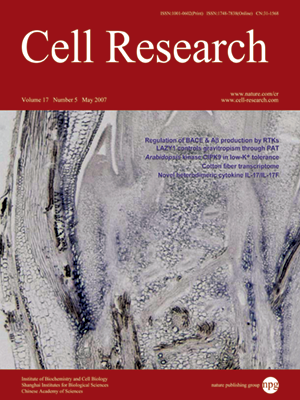
Volume 17, No 5, May 2007
ISSN: 1001-0602
EISSN: 1748-7838 2018
impact factor 17.848*
(Clarivate Analytics, 2019)
Volume 17 Issue 5, May 2007: 441-448
ORIGINAL ARTICLES
Bcl-2 cleavages at two adjacent sites by different caspases promote cisplatin-induced apoptosis
Jianbei Zhu1, Ying Yang1 and Jiarui Wu1,2
1Key Laboratory of Systems Biology, Institute of Biochemistry and Cell Biology, Shanghai Institutes for Biological Sciences, Chinese Academy of Sciences, 320 Yueyang Road, Shanghai 200031, China
2Hefei National Laboratory for Physical Sciences at Microscale and School of Life Sciences, University of Science & Technology of China, Hefei 230027, China
Correspondence: Jiarui, Wu(wujr@sibs.ac.cn)
The protein encoded by
bcl-2 proto-oncogene plays an important role in the mitochondria-mediated apoptotic pathway. Although the general role of Bcl-2 is anti-apoptotic, previous work showed that Bcl-2 fragments cleaved by caspases could promote apoptotic process. We report herein that Bcl-2 protein was cleaved to produce two fragments of around 23 kDa in human hepatocarcinoma BEL-7404 cells or in Bcl-2 overexpressing CHO cells induced by cisplatin. Treating cells with the general caspase inhibitor z-VAD-fmk blocked the induced cleavage of Bcl-2. Mutagenesis analyses showed that Bcl-2 was cleaved by caspases at two adjacent recognition sites in the loop domain (YEWDD
31↓AGD
34↓V), which could be inhibited by caspase-8 and -3 inhibitors, respectively. Overexpression of the carboxyl terminal 23 kDa fragments increased the sensitivity of CHO cells to cisplatin-induced apoptosis. These results indicate that Bcl-2 can be cleaved into two close fragments by different caspases during cisplatin-induced apoptosis, both of which contribute to the acceleration of apoptotic process.
Cell Research (2007) 17:441-448 doi: 10.1038/cr.2007.36; published online 24 April 2007
FULL TEXT | PDF
Browse 1823


